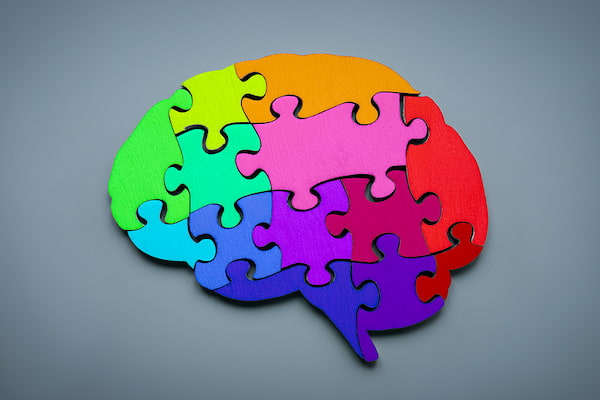Neurodivergent Counseling
Neurodivergence is a beautiful example of how the human mind develops differently in every person. Unfortunately, this beauty often goes unrecognized in a world not built to accommodate differences. In therapy, you can learn to accept who you are, embrace your unique abilities, and build practical tools to improve life in tangible ways.
Key Points
- Neurodivergence is often misunderstood and unaccommodated.
- Neurodivergence affects sensory processing, emotional regulation, and executive functioning.
- Neurodivergent individuals often engage in masking to fit societal expectations.
- Therapy can support unmasking, embracing neurodivergence, coping mechanisms, and self-acceptance.
Overview — neurodivergent adults
Any neurodivergent adult knows that the world was not set up to accommodate them. This may be exactly how you feel.
You may have always felt different from those around you. It’s possible you’ve spent much of your life feeling misunderstood but haven’t known how or haven’t wanted to explain your way of thinking to the rest of the world.
The struggles you face as a neurodivergent adult can be debilitating and life-altering. They can affect your relationships and your overall sense of happiness. At our practice, we are dedicated to helping you navigate a world that works against you while also staying true to yourself.
Neurodivergence is not one "thing"
Neurodivergence can take many different forms—including ADHD, autism, or a learning disability. Often, a person may not even know they are neurodivergent because they don’t fit a stereotype or look a certain way.
Growing up without understanding that you’re neurodivergent can be very painful, as it leaves you asking questions like, ‘What’s wrong with me?’ and ‘Why do things come so much harder for me?’
Of course, the answer to these questions is that there is nothing wrong with you and that you are living in a world that is not set up for the way your brain works.
Neurodivergent brains work differently
Neurodivergent brains take in sensory input, regulate emotions, and manage executive function differently than neurotypical brains. Neurodivergent individuals can easily become overstimulated, understimulated, or intensely emotional over a seemingly insignificant event. It may be more difficult for them to accomplish specific tasks despite a genuine desire to do so.
The symptoms of neurodivergence can make living in our very quick, very busy, and very noisy society much more difficult.

Masking and other tactics to manage can backfire
Because your brain works so differently when you are neurodivergent, you spend a significant amount of time and energy learning to cope with a world that does not accommodate these differences. That can look like developing strict schedules, avoiding specific situations, and masking your true self. You probably spent a long time learning to force yourself into the shape the world thinks you should be.
While masking may make others happy, it forces you to betray yourself. Instead of accepting yourself for who you are, you may feel constantly trapped. The world misses out on innovative insights, creative solutions, and fascinating perspectives that you — as a neurodivergent individual — could bring to the table.
Often, the mask doesn’t work. You might be unable to do what people ask or unable to be what people want. This is harmful and causes deep feelings of guilt and shame.
Have you been misdiagnosed?
Neurodivergent individuals are often misdiagnosed with depression or anxiety. While you may also experience these challenges, treatment for depression or anxiety does not address the root problem – your experience as a neurodivergent individual.
Have you struggled to maintain relationships, experienced burnout, or an inability to stay on a consistent medication regime? These and other symptoms can result from the difficulties of living as a neurodivergent individual.
Struggling does not have to be your reality. With therapy, you can learn how to embrace your unique experience of the world while also finding your place in it.
What therapy looks like
At our practice, you do not have to worry about being misunderstood. Our therapists understand not only how masking affects your daily life but also how it affects your progress in therapy.
Therapy with us is non-judgmental, understanding, and compassionate. We strive to create an environment that allows you to slowly unmask and relearn what it means to be the complete, unedited version of you. You will learn how to live in and work with a world not built for you while simultaneously not allowing that world to cage you.
By learning coping skills and self-acceptance, you can finally begin to feel happy, seen, and free.
References
Bowers, C., & Widdowson, M. (2023). Transactional Analysis Psychotherapy with Clients who are Neurodivergent: Experiences and Practice Recommendations. International Journal of Transactional Analysis Research & Practice. https://doi.org/10.29044/v14i1p32.
Chapman, R., & Botha, M. (2022). Neurodivergence‐informed therapy. Developmental Medicine & Child Neurology, 65, 310 – 317. https://doi.org/10.1111/dmcn.15384.
Dan, B. (2023). Neurodevelopmental impairment advantage: The ability capital. Developmental Medicine & Child Neurology, 65. https://doi.org/10.1111/dmcn.15723.
Ortega, F. (2009). The Cerebral Subject and the Challenge of Neurodiversity. BioSocieties, 4, 425-445. https://doi.org/10.1017/S1745855209990287.
